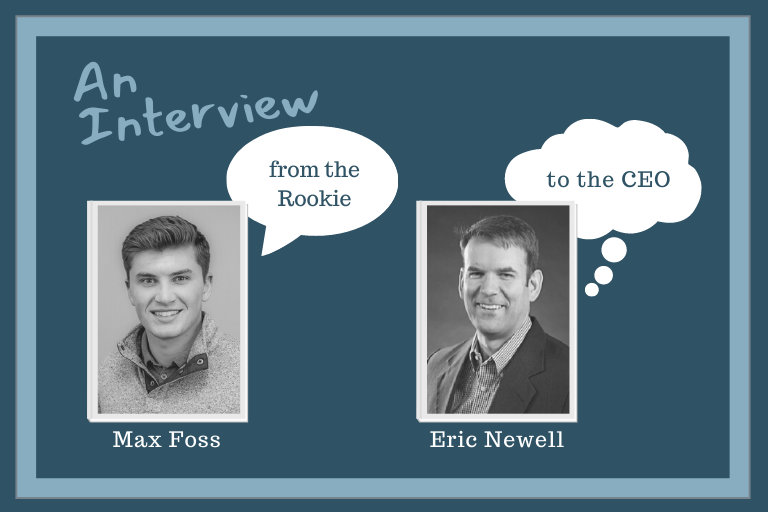8 Burning Questions from a Rookie to the CEO
I had the opportunity to sit down with our CEO, Eric Newell this past week. Being one of the youngest employees at Stoneridge Software, I thought this was a good opportunity to pick his brain, and learn a little bit more about what drives him, Stoneridge Software, and try to get some advice for the future.
1. What keeps you inspired?
Eric Newell: A couple of things keep me inspired, I love to see efficiency in everything I do or that I am involved in. One of my favorite things to do is solving efficiency problems.
I enjoy working with my team. We take our work seriously, but we don't take ourselves too seriously.
Spending time with people who are equally as passionate about work makes work fun.
2. How do you balance work and life?
Eric Newell: I've always prioritized my family's activities. I would build my travel schedule around my kids' activities so I could go to their volleyball and basketball games. I always make sure I'm available for my family.
The key thing is to put your priorities first, and then build your work schedule around it.
3. What advice would you give students looking to get into the software industry?
Eric Newell: What I think puts you in the best position to be successful is if you have to be able to communicate. You have to be able to communicate both written and verbally to become a leader in your organization.
You should develop a skill. Whether it's accounting, computer science, engineering, or any sort of skill where you show value to an employer. Pairing your skill with the ability to communicate is the combination I look for.
4. What should be a student's focus in school vs. when they graduate?
Eric Newell: One thing I didn't do, that I wish I had done, was to get an internship in college. I think internships are great for getting experience. I would also find opportunities to write. Whether it's for a paper or starting a personal blog, the more you write the better you get at it.
Once you get your first job, work extra hours. That way you'll get really good at it, and show that you really know how to do the job. Put your best foot forward and concentrate on being great at your job.
5. What advice would you give to a 21-year-old Eric?
Eric Newell: At 21 I started my first real job, and I started a small company on the side. I wish I would have developed more skills such as marketing or accounting. If you develop those skills at a young age, it will really help you in your career.
6. What is the most important thing to look for in a job?
Eric Newell: I think at a younger age, I would try to look for a unique, interesting experience that will teach you something you don't know. You may not always love it, but you will learn so much, and you'll have a wide variety of experiences before you choose a company you want to "grow old" with. You'll learn what you're really passionate about.
7. What are some of your biggest learnings since starting Stoneridge Software?
Eric Newell: There has been a lot, but to be concise, here are a few things I've learned from our first eight years in business:
- Have a sales plan
- Hire the right person, not just the best available
- Invest in processes and methodology
- Create a great leadership team
- Be able to adapt
8. What is one you wish you knew before starting Stoneridge Software?
Eric Newell: I wish I knew how to sell software. Although I had been involved in the industry, I didn't know the first thing about selling software. I needed to understand the sales process and what customers are thinking about when they are evaluating and purchasing. I thought the software would sell itself, and that's not the case at all.
In Conclusion
I enjoyed the opportunity to sit down with Eric because I learned so much about what makes him successful. As I begin my career, this advice will be extremely valuable to me. My biggest takeaways from visiting with the CEO:
- Trying to find what makes you tick, or what you're passionate about can be difficult, but the more experiences you have you'll figure it out
- Learning how to manage your work/life balance can be challenging, but important
- Making mistakes is inevitable but learning from those mistakes is critical
Under the terms of this license, you are authorized to share and redistribute the content across various mediums, subject to adherence to the specified conditions: you must provide proper attribution to Stoneridge as the original creator in a manner that does not imply their endorsement of your use, the material is to be utilized solely for non-commercial purposes, and alterations, modifications, or derivative works based on the original material are strictly prohibited.
Responsibility rests with the licensee to ensure that their use of the material does not violate any other rights.

